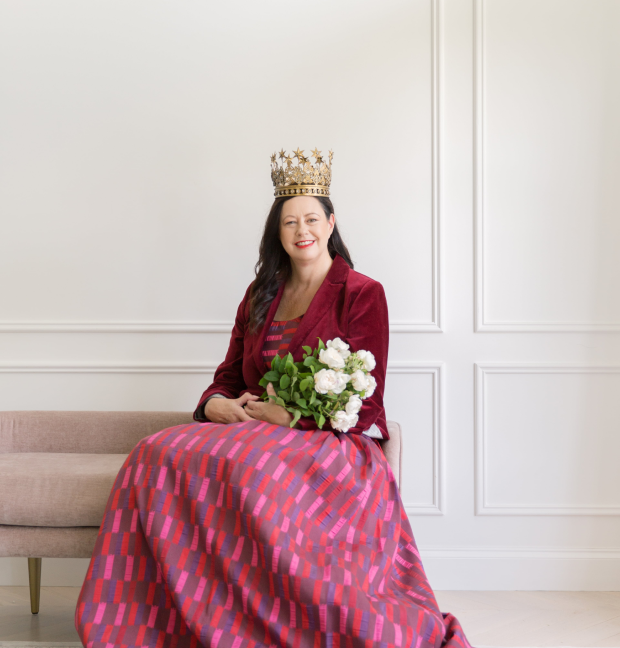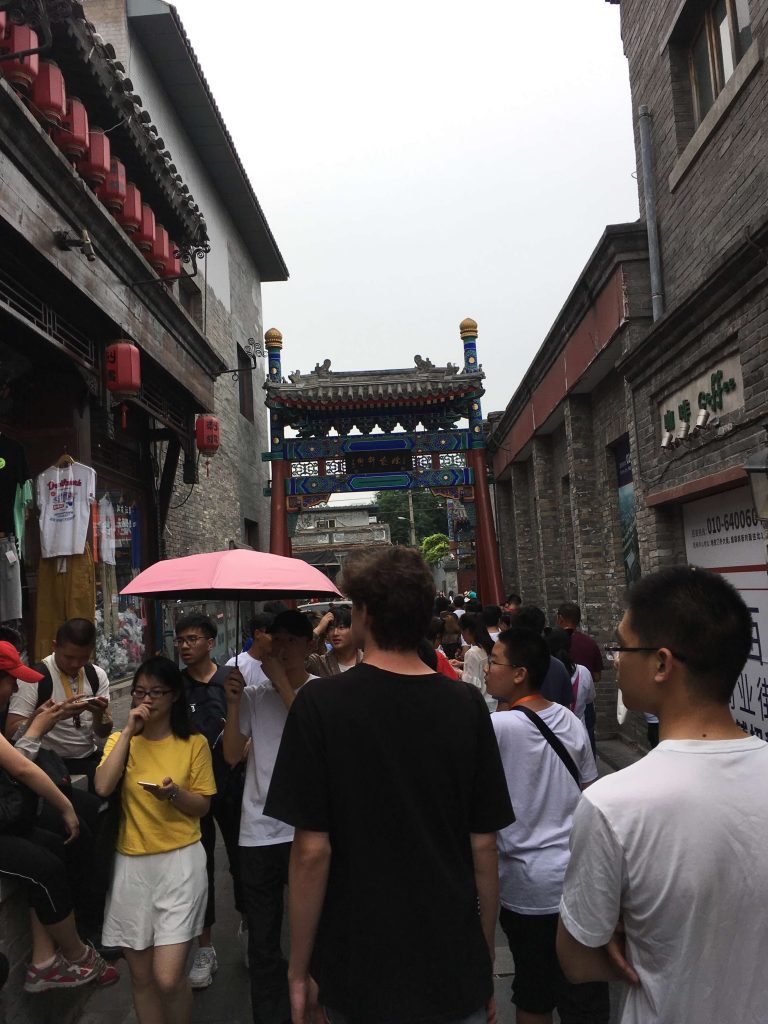
I have always wanted to go to China and see the Great Wall, and last year I finally had to opportunity to do so, as I travelled to Beijing and Inner Mongolia to undertake research for my novel The Blue Rose.
In this novel, my Welsh gardener David travels to China as part of the British embassy to the emperor, led by Lord Macartney. The ambassador wished to persuade the Chinese emperor to open up trade with Britain, which was suffering a huge trade imbalance as the English bought up vast quantities of tea, silk, porcelain and the gorgeous blooms of peonies, camellias, jasmine, magnolias and other exotic Chinese flowers (including the ever-blowing, blood-red rose that is at the heart of my novel).
I travelled with my son Ben, who had just turned twenty. We flew first to Beijing, and had a few days there exploring the old quarter. It was remarkably close to what it must have been like in 1792, when the ambassador and his entourage travelled inside the city walls, among the first Westerners permitted within. My son Ben is very tall, with fair skin and blue-grey eyes, and it was interesting to see how much attention he attracted as we explored the narrow alleyways. It gave me a fascinating insight into what the men of the British embassy must have felt like as they walked the same streets, dressed in their tight breeches and tricorn hats, many of them wearing powdered wigs on their heads.
This is how I wrote the scene in The Blue Rose:
The embassy reached Peking on the 21st of August.
Lord Macartney and Sir George and his son were carried in red lacquer palanquins, gaudily painted with golden dragons, but the rest of the entourage were crammed into common hired carts, with a roof of coarse straw matting. The horses were raw-boned and harnessed with rope, and no attempt had been made to match one to the other. It took seventy carts to carry them all, with four hundred porters trudging ahead, carrying the baggage.
‘This is not how the British embassy should be received!’ Anderson cried. ‘Where is the pomp and spectacle, the magnificence of one great nation welcoming another? Are we not the first nation in the west and China the first nation in the east?’
David and Scotty and a few of the other young men preferred to ride, and – after a great deal of argy-bargy complicated by the language divide – were at last given some short rough-coated ponies to ride, with gaudy over-decorated saddles and bridles. It was a relief to be free of the carts, though, which had no springs of any kind, and David relished the chance to see more of the countryside.
Thousands of people had gathered to watch the procession, climbing the ancient willow trees to see more clearly or pushing so close on to the highway that the Chinese soldiers had to beat them back. Some were struck with wonder and fear, hiding their children behind their gowns. Many others pointed and made unpleasant scoffing sounds. Some even spat.
‘Why do they stare so?’ David asked uncomfortably.
‘They think you devils,’ Father Li explained, in his oddly accented Latin. ‘In Chinese theatre, only devils wear such tight clothes, or have red hair. And your eyes are wild beast eyes, devil eyes.’
‘Maybe I should wear tinted spectacles,’ David muttered, and fixed his gaze on the dusty road.
At last the city walls of Peking reared above them, nearly fifty feet tall and immensely thick. One could have galloped a horse along the wall’s broad top. As the ambassador approached the wall, he was welcomed by the ritual firing of guns, which cast a pall of smoke over the scene. Refreshments of cold fruit and drinks were given to the hot and perspiring foreigners within the shelter of the gate. Then they were ushered into the city, the mandarins leading the way, their servants shading them with silk parasols, soldiers keeping back the crowds with whips.
The road was lined with shops decorated with tall gilded pillars and intricately carved woodwork. Long banners hung with Chinese characters swayed in the breeze. Old men scurried ahead of the entourage, sprinkling water on the roads to keep the dust down.
Riding on his pony, David was able to see over the heads of the teeming crowds and down the narrow alleyways, lined with rows of dilapidated grey houses with grey tiles. They were so low and uniform, and so lacking in windows, it looked like an encampment of army tents.
Men with long bamboo poles resting on their shoulders carried straw baskets filled with persimmons and dragon fruit. A young man in a loose robe and flapping queue ran past, clutching rolls of brightly coloured silks under his arms. An old pedlar with a weathered face and no teeth sat behind a table piled high with desiccated bats, dried snakes in stiff coils, animal horns, ginseng and severed tiger paws.
One shop had a display of exquisite porcelain plates and jars, decorated with sinuous dragons or graceful designs of cobalt-blue roses and peonies. Another shop sold coffins carved from incense cedar, the lid sweeping upwards at either end like the eaves of a temple. A silversmith bent over his work in a window, the tink-tink-tink of his hammer cutting through the clamour of the crowd.
In flimsy street-stalls, blind fortune-tellers read horoscopes, singers warbled to the accompaniment of strangely shaped stringed instruments, and storytellers beguiled their audiences with tales of love, betrayal and reunion.
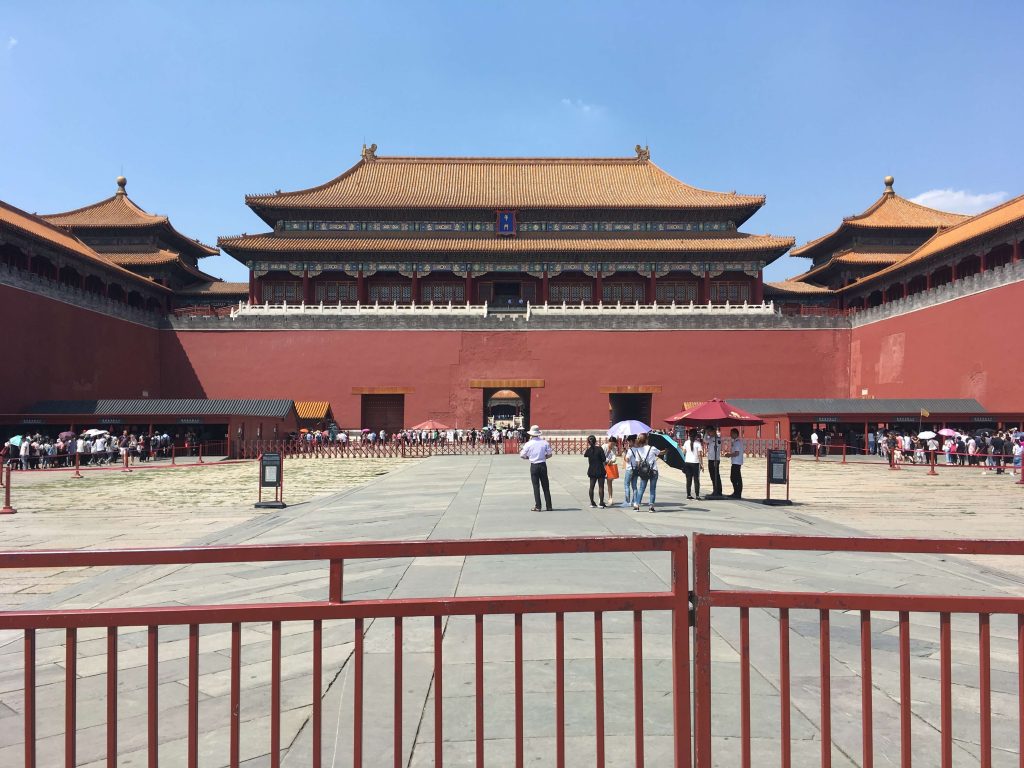
Ben and I also had a private tour of the Forbidden Palace, which was once utterly forbidden to foreigners. The Macartney embassy were not permitted within, much to their disappointment. They saw only a glimpse:
The road led through a grand gateway of gilded and carved timber, painted with Chinese inscriptions of luck and good fortune, then the cavalcade turned to the west. David saw ahead a glimpse of a high grey wall, and above it a roof of varnished yellow tiles with gently upturned ends, adorned with an array of fanciful figures, shining like gold under the brilliant sun. His heart thumped hard.
‘Look,’ he said to Scotty. ‘The Forbidden City.’
They stared long and hard, but saw no more than a few other golden roofs beyond, then – in the distance – an artificial hill adorned with a pavilion with three stacked roofs, each with those elegant upswept eaves.
Then they turned a corner, and rode beside a high wall. A gate, tall and ornate, painted jade green, lacquer red, imperial yellow, studded with rows of gilded knobs. David instinctively counted. Each door had nine rows of nine knobs.
‘The Emperor’s number,’ Father Li said softly. ‘It sounds like “jiu” which means everlasting. He wears nine dragons on his robes, and there are, I have heard, nine-thousand-nine-hundred-and-ninety-nine rooms in the Forbidden City. Only one gate does not have the nine rows of nine studs. That is the Flowery Gate, which has nine rows of eight studs. That is the gate through which the dead pass.’
‘May we go in?’ Thomas asked ebulliently. ‘I’d so love to see inside.’
‘No,’ Father Li replied.
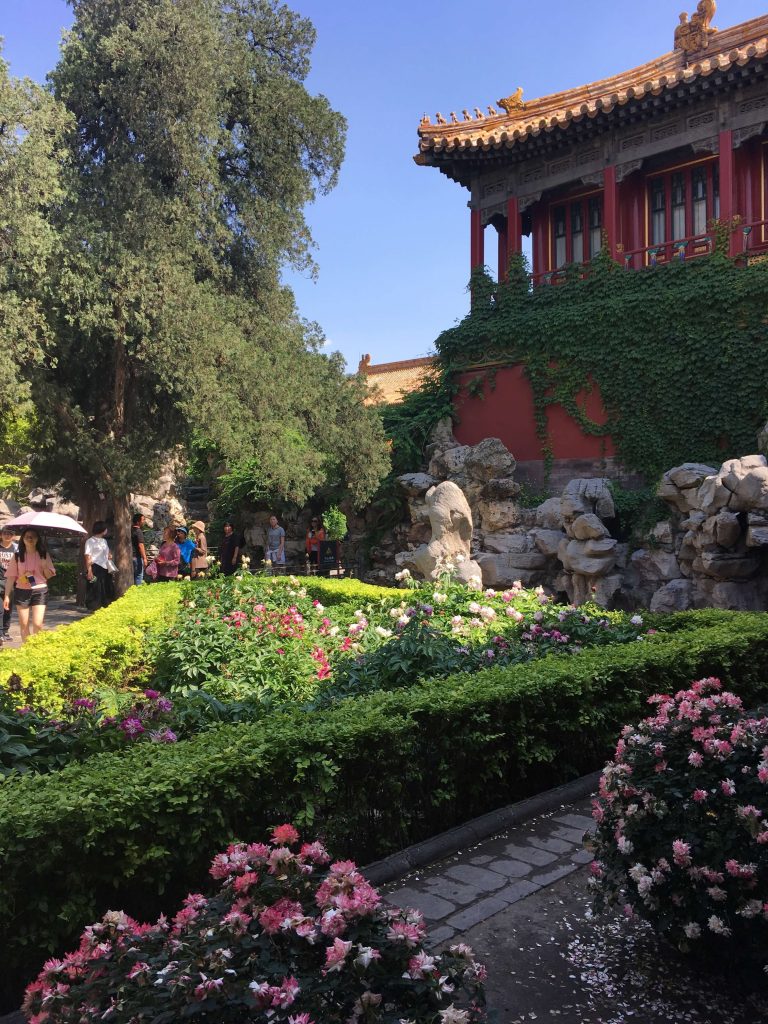
The Forbidden Palace was absolute huge, and it took hours to walk around its many small pavilions and courtyards and gardens. We also went to see an exhibition of imperial treasures, which was of great help to me in describing what the emperor’s court may have looked like in the 1790s.
Another day we drove out to the Great Wall of China. I’ve always wanted to climb the wall, and it’s been on my 50/50 list for ages. It was very hot and very crowded, but we crammed our hats on our heads, slathered ourselves with sunscreen, took bottles of water and set out with great determination.
The wall – called cháng chéng (or ‘long city’ in Chinese) – snakes across China for more than 21,000 kilometres, though much of it is now only rubble. It was originally conceived by Emperor Qin Shi Huang in the 3rd century B.C. to keep out barbarian hordes, but it took many hundreds of years to build. Much of it was made as little more than a high rampart of earth, with the series of fortified walkways, steep steps, beacon-towers and guardhouses around Beijing built about 500 years ago. Although few Westerners had seen it, the British embassy knew of its existence and were thrilled at the opportunity to see it. Many brought back souvenirs to Britain.

‘Look!’ David stood up in his stirrups and pointed. ‘There it is.’
Above them a long serpent of stone twisted along the mountain ramparts, writhing down precipitous cliffs and climbing up to great square guard towers and smaller watchtowers. Beyond, sharp mountains like jagged teeth.
A chill ran over David’s body, raising the hairs on his skin.
‘The Great Wall,’ he whispered.
‘What a stupendous piece of work,’ Lord Macartney exclaimed, moved to awe for the first time since arriving in China. The mandarins were surprised, considering the dilapidated old barricade to be of little interest.
‘But it is two thousand years old,’ David exclaimed. ‘And more than five thousand miles long.’
Sir George set his surveyors to measuring the ramparts and parapets, and testing the geology of the stones. The Chinese guards were wary and suspicious, with some reason. David had to admit the British officers had surreptitiously been taking notes of the country’s defences and armaments at every step of their journey.
David and Scotty and a few of the other men set out to climb to the top, accompanied as always by Father Li and a bevy of disgruntled mandarins. The steps were so steep, the back of David’s legs were soon aching. Panting and laughing, they scrambled at last to the highest watchtower. It had the most extraordinary view across steep mountains and valleys, the stone wall scaling the peaks as far as the eye could see.
It was no wonder the wall was called the Stone Dragon, he thought. One could almost imagine it had once flown the skies and now only slept, waiting to be awoken again.
David stood as long as he was permitted, watching the shadow of the Great Wall stretch long. At last, his arms tugged on by three or four different mandarins, he allowed himself to be hustled back down the rough, uneven steps. As he left the wall, he bent and picked up a fragment of broken stone and put it in his pocket.
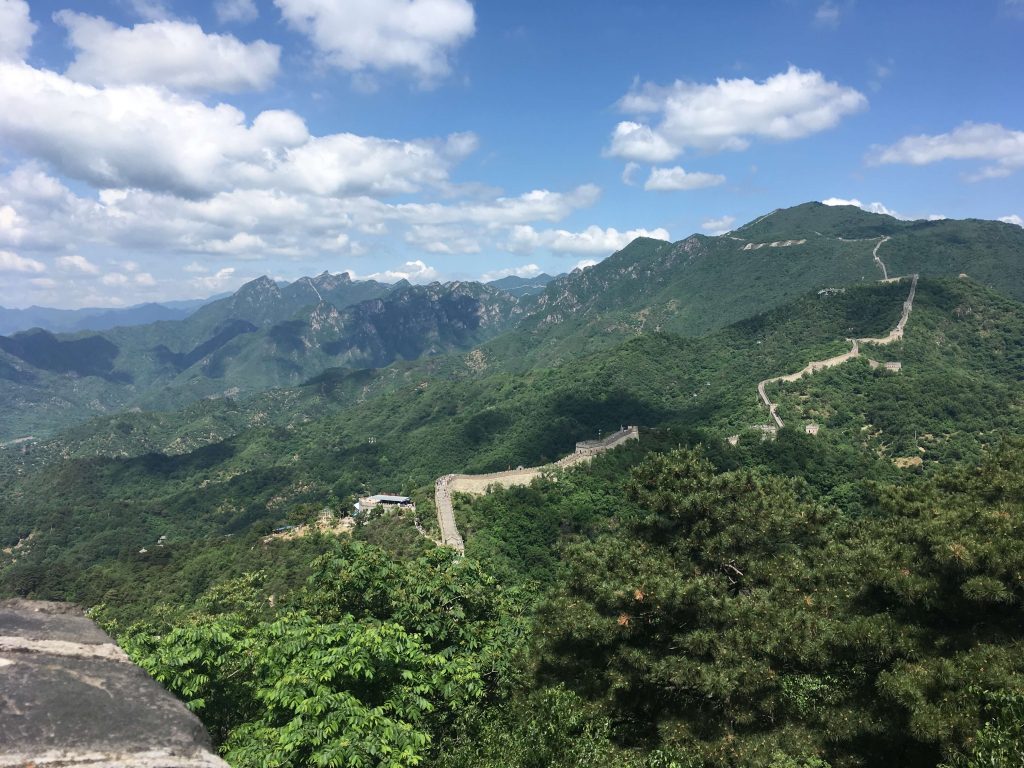
The British embassy crossed the wall on their way to the emperor’s summer palace, high in the mountains of what is now Inner Mongolia. It took them several weeks of travel on horseback and in palanquins; we drove it in a day.
It was much colder up in the mountains, and we were the only Westerners. As always, my tall blue-eyed son attracted a great deal of attention. Everyone wanted to take selfies with him, and he had to bent down low to try and match their considerably shorter height. Children threw firecrackers at our feet, filling the air with acrid smoke and the street with scraps of red paper that blew about in the icy wind. No-one spoke English, and none of the restaurants had English menus, so choosing what to eat was a challenge. And there was no wifi, so we could not use Google Translate. The supermarkets were filled with tanks of live fish and lobsters and baskets of strange-looking fruit, but we could not find milk anywhere (let alone gin and tonic). It was confronting, bewildering and wonderfully outlandish to our Western eyes, and made me understand what a cultural clash it must have been in 1792, when Lord Macartney first arrived here, against the emperor’s will.
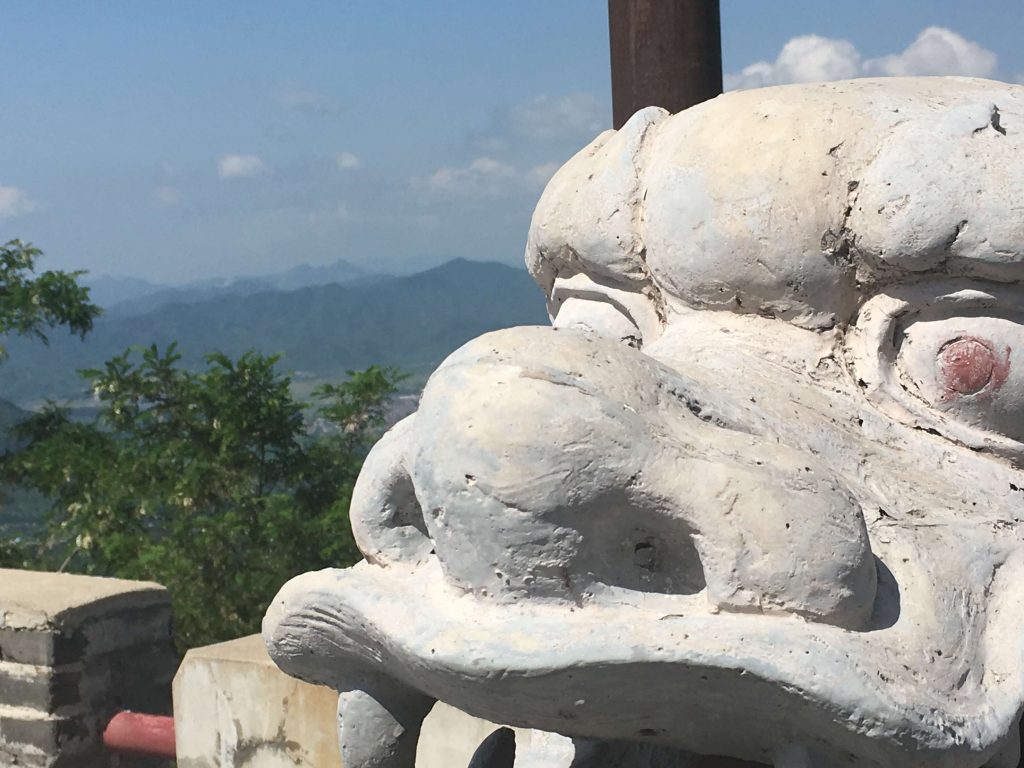
At that time in China, the emperor was meant to be greeted by the grand kowtow, which involved dropping to one’s knees and banging your forehead to the ground nine times. Lord Macartney was determined not to demean himself so, and so declared he would offer the emperor the same reverence he offered his own king. This caused much consternation among the Chinese courtiers, and ultimately led to the failure of the embassy. This is how I describe the scene in The Blue Rose:
On the tenth day of the eighth lunar month in the fifty-eighth year of his rule, the Great Emperor and Son of Heaven, Kien Long, at last permitted the English ambassador and his entourage to appear before the celestial court.
They were roused at three o’clock in the morning and hurried through pitch darkness, only the occasional paper lantern showing the way. For an hour they stumbled through the mist-wreathed night, in irrecoverable confusion, like children playing blindman’s bluff. Then they were left to wait in the cold and dark for hours, stamping their feet and blowing into their hands, muttering testily to each other.
At dawn, a long procession of minor nobles and court officials rode in upon horses, their rank expressed in the embroidered panels upon their robes and the tiers of the jewelled finials upon their hats. They were accompanied by standard-bearers holding aloft long silken banners, and guards dressed in heavy cream jackets studded with brass rivets and conical helmets with a thick tassel of red-dyed horsetail.
Then the emperor was carried into view, seated in a gilded chair borne by sixteen men. He was thin, a little hunched, with smooth ageless skin and dark inscrutable eyes. He wore a loose robe of yellow silk embroidered with five-clawed dragons and stylised clouds, mountains and waves. On his head was a black velvet cap decorated with pearls and peacock feathers. A servant held a long-handled parasol above his head, while musicians playing their strange instruments followed behind. As he came into view, every single man in the crowd dropped to his knees and banged his head to the ground again and again.
With great dignity, Lord Macartney dropped to one knee, removed his hat and bowed his head. David and the other men did the same. The emperor ignored them.
Our trip to China was absolutely fascinating, and helped me visualise the celestial empire of the 1790s so clearly.
And I have managed to cross another adventure off my 50/50 Project!

